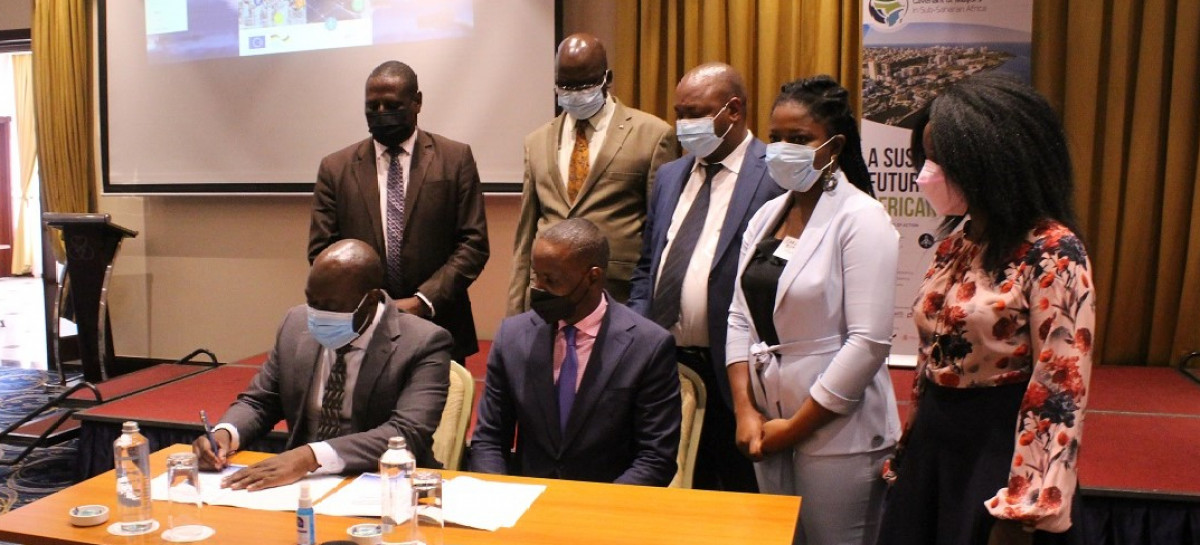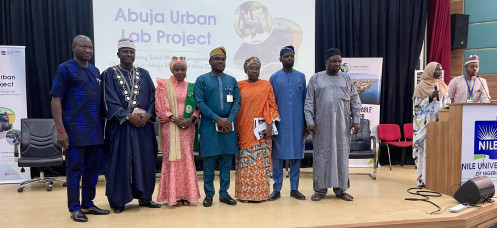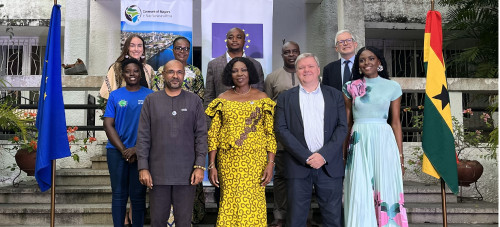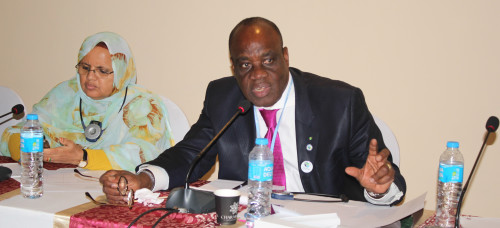Nakuru County launches climate action plan to ensure a sustainable future for its people
Published: 23 Feb 2022

“This plan will not merely be shelved. It will be used as daily guidance for the grassroots actions needed to achieve Nakuru County’s climate change and sustainable energy vision”, said Erick Korir, Deputy Governor at the launch event on 15-16 February 2022.
Nakuru is the only city in the world that is tucked in between a vast lake and a mountain crater. While this beauty draws tourists from all over the world, climate change is posing a threat to the region: people are experiencing increased rainstorms and floods, and these impacts will only intensify if no action is taken. Tree cutting and farming along the mountain slopes is a way of life but without enough trees to act as a buffer, the floods alone could wreak havoc on the local communities.
But Nakuru’s leaders have practical plans to transform the County, not only to safeguard it against the impacts of climate change, but also to reduce future greenhouse gas (GHG) emissions whilst providing sustainable energy to all citizens. The road to achieving this ambitious vision is captured in the County’s newly launched Sustainable Energy Access and Climate Action Plan (SEACAP). The Deputy Governor officially signed and launched this landmark document, amplifying the County’s already strong reputation as a national and continent-wide leader in climate action.

Eng. Festus K. Ng’eno, CECM, Water, Environment, Energy & Natural Resources; HE Hon Dr. Erick Korir, Deputy Governor; Carine Buma, ICLEI Africa;
Eng. Reuben Maritim, CEE Roads, Transport & Public Works; Mr. Kiogora Murithi, Chief Officer for Environment, Energy, Natural Resources and Climate Change;
Ms Grace Karanja, the County’s Director for Environment, Energy, Natural Resources and Climate Change ©GIZ
“Through the development of the SEACAP, Nakuru has once more shown its position as a leading County in Kenya in addressing the impacts of climate change,” said HE Hon Dr. Erick Korir, Deputy Governor, Nakuru County. “Nakuru is indeed a county of unlimited opportunities, but we can only realise these climate change mitigation and adaptation targets if we continue working together.”
Creating actions that are practical, achievable and based on the County’s current climate reality required a participatory approach, as summarised by one of the County’s Chief Executive Committee Members (CECMs). “The realisation of these plans has been thanks to a joint effort from County government, various national government ministries and international development partners, mainly GIZ, ICLEI Africa, African Centre for Technology Studies (ACTS), EED Advisory, and Web Limited,” said Eng. Festus K. Ng’eno, CECM, Water, Environment, Energy & Natural Resources. “We have involved stakeholders from different departments, targeting technical staff, decision makers and civil society.”
“It was important to involve the communities in developing these plans, because the people who have lived in Nakuru for a long time have key insights on how the climate has changed over the years, which we couldn’t necessarily identify with traditional data collection methods,” added Carine Buma from ICLEI Africa, who provided a brief overview of the SEACAP findings.
The SEACAP highlights that if no climate action is taken, GHG emissions are set to increase 65% by 2030 and the County will experience more frequent and intense rainstorms, floods, drought and waterborne diseases. Nakuru thus aims to reduce its emissions by 33% by 2030, in line with the national level target (the Nationally Determined Contributions) and ensure that the County is climate resilient with sustainable ecosystems and livelihoods by 2030.
The actions outlined in the SEACAP will address all of the above challenges, some of which include constructing roads for walking and cycling, expanding public transport, enhancing waste management and recovery of recyclable materials and producing briquettes from organic waste. The County also plans to promote sustainable farming practices, increase urban green spaces, reduce waterborne diseases and roll out off-grid solar systems and clean cooking solutions.
“Now that the plans are in place, it is time for implementation. We are not only creating a plan, but we are ready to move forward. And we are ready to work with many stakeholders to bring these plans to life,” said Ms. Grace Karanja, the County’s Director for Environment, Energy, Natural Resources and Climate Change.
“The County is already developing a project to lower the energy used to pump water by installing more efficient pumps and using solar energy to power them,” added Mr. Abel Omanga from GIZ in Kenya.
The actions outlined in the SEACAP, will come together to create the County its people envision and an example for others in sub-Saharan Africa to follow.





